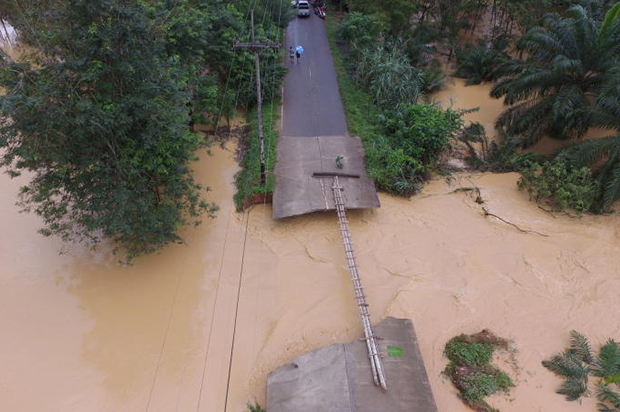
The private sector has estimated the cost of the severe flooding in the South at no more than 15 billion baht and having little effect on overall economic growth.
The floods have ravaged 10 provinces in the region since the New Year, with the situation now starting to ease in Yala and Ranong accoording to the Disaster Prevention and Mitigation Department.
About 1 million people have been affected, with 21 people dying as a result of the flooding.
Chen Namchaisiri, chairman of the Federation of Thai Industries (FTI) said the Joint Standing Committee on Commerce, Industry and Banking estimated damage to the economy would be around 10 billion baht, and it should not exceed 15 billion baht. That would have minimal impact to the country’s gross domestic product (GDP).
“Floods mainly cause damage to roads, bridges and transport routes, but not much to machinery or the production process, which are generally covered by insurance. So the impact on the private sector is quite limited,” he said.
There would be delays in transporting goods in some areas as they must use alternative routes. Even so, the situation should return to normal by the end of the week.
Mr Chen was optimistic that business in flood-hit areas would bounce back, as repairs to damaged infrastructure and roads would require government spending.
Issara Wongkusolkij, the Thai Chamber of Commerce chairman, said the flooding had not affected the overall tourism situation in the South. Major tourist destinations, especially Phuket and Krabi, had escaped lightly.
Predee Daochai, chairman of the Thai Bankers' Association (TBA), said the association would have to wait a while before evaluating the situation. The banks could provide assistance by delaying debt repayments or extending loans for house repairs.
The impact on the South was on a much smaller scale than the great floods of 2011.
Deputy Prime Minister Tanasak Patimapragorn, said there was no decline in the number of tourists to the South as a consequence of the flooding. They generally booked ahead. The Tourism and Sports Ministry will inspect tourism attractions which might be damaged over the next 10 days in Chumphon, Nakhon Si Thammarat, Phatthalung and Songkhla.
Reuters reported rubber production in the region had been affected.
Southern Thailand is a major rubber-producing area and the floods have come at a particularly bad time for farmers, said Uthai Sonlucksub, president of the Natural Rubber Council of Thailand.
"This the worst impact we have had in the area in 10 years. The floods are very heavy. The problem is this year we've seen both drought and flooding so it has been disastrous for rubber farmers," Uthai told Reuters.
Uthai said that rubber prices would increase this year because demand is set to exceed supply.
